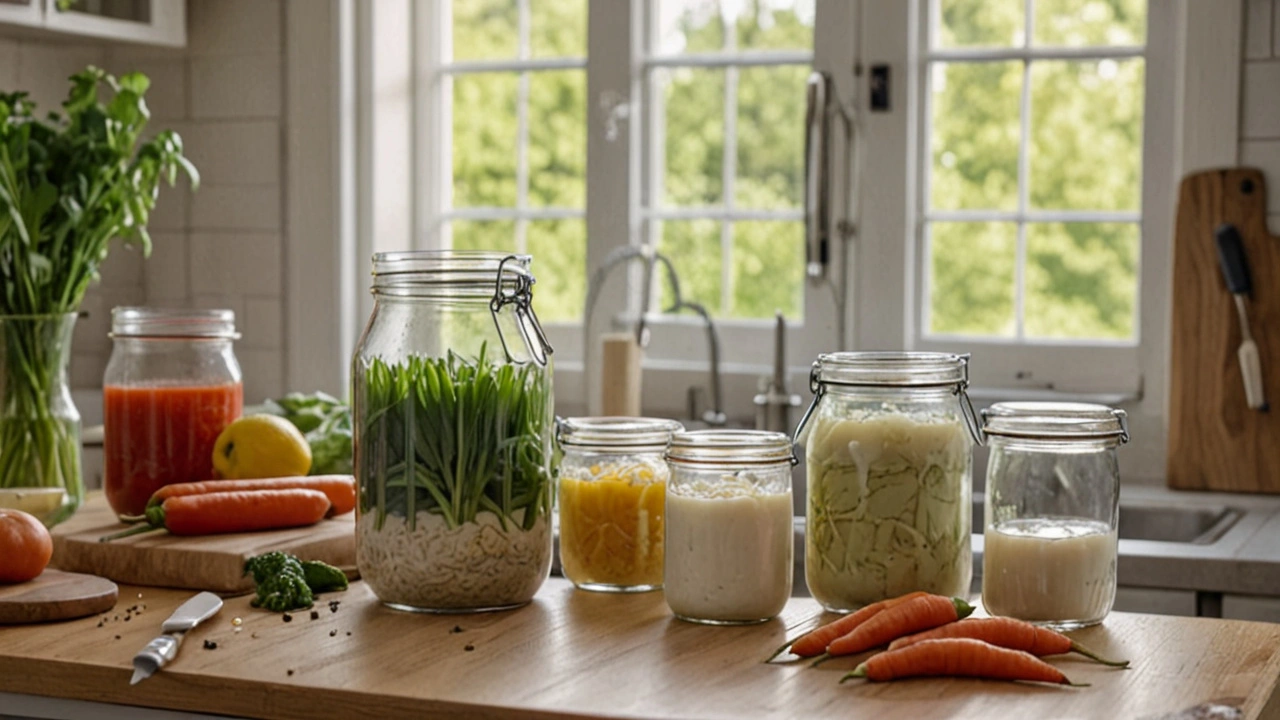When it comes to overall health, your digestive system plays a crucial role. A healthy gut not only aids in nutrient absorption but also impacts other areas of your well-being, from your immune system to your mood.
Fortunately, there are numerous natural ways to enhance your gastro health. By making a few lifestyle adjustments, you can nurture and support your digestive system. Let's dive into some practical tips and tricks that can help you maintain a happy and healthy gut.
The Role of Diet
What you eat can have a profound impact on your digestive health. The saying 'you are what you eat' often rings true, especially for your gut. One of the most significant changes you can make is to increase the amount of fiber in your diet. Fiber helps to keep things moving smoothly through your digestive tract by adding bulk to your stool. It's found in fruits, vegetables, whole grains, and legumes.
Regular intake of fiber can help prevent constipation and improve overall gut health. According to the Institute of Medicine, women should aim for about 25 grams of fiber daily, while men should target 38 grams. If you're not used to a high-fiber diet, increase your intake gradually to avoid bloating and gas.
Apart from fiber, it's essential to include a balance of macronutrients like proteins, fats, and carbs. Lean proteins such as chicken, fish, and legumes are excellent choices. Healthy fats like those found in avocados, nuts, and olive oil can also be beneficial. Carbohydrates should come from whole grain sources rather than refined sugars to maintain steady blood sugar levels and provide lasting energy.
Avoiding overly processed foods and incorporating whole, natural foods can take a load off your digestive system. The American Gastroenterological Association points out that processed foods often contain additives, preservatives, and artificial colors, which can disrupt gut health. Removing these can lessen your chances of developing inflammatory conditions and digestive issues.
Dr. Michael Greger once said, "Our understanding of good nutrition was complicated by the fact that most diet-related studies, until recently, focused on eating nutrients, not food."
Incorporating a variety of foods ensures that you get a wide range of nutrients, vitamins, and minerals. This variety can help cultivate a more diverse gut microbiome, which is essential for a healthy digestive system. Research has shown that people with a more diverse gut microbiome tend to have better overall health and fewer gastrointestinal issues.

Benefits of Probiotics
Probiotics have become a popular topic in recent years, and for a good reason. These beneficial bacteria are like the unsung heroes of your gut, working tirelessly to keep your digestive system running smoothly. Probiotics are live microorganisms that, when consumed in adequate amounts, offer a wide range of health benefits, particularly for your gastrointestinal health.
One of the primary benefits of probiotics is their ability to maintain a balanced gut microbiome. Your gut is home to trillions of bacteria, both good and bad. When the balance between these bacteria is off, it can lead to a variety of digestive issues, such as bloating, constipation, and even more chronic conditions like irritable bowel syndrome (IBS). By introducing probiotics into your diet, you help to tip the balance in favor of the good bacteria, which can aid in digestion and improve your overall gut health.
Probiotics also play a crucial role in enhancing your immune system. A significant portion of your immune system is located in your gut, and the beneficial bacteria found in probiotics can help to stimulate the production of antibodies and strengthen your body's natural defenses. By supporting your immune system, probiotics can help you ward off illnesses and infections more effectively.
An interesting fact about probiotics is their potential to improve mental health. The gut-brain connection is a topic of growing interest among researchers, and studies have shown that a healthy gut can positively impact mood and cognitive function. For example, certain strains of probiotics have been found to reduce symptoms of anxiety and depression by influencing the production of neurotransmitters such as serotonin. This highlights the importance of a healthy gut not just for physical health but also for mental well-being.
"Probiotics can have a significant impact on your gut health, which in turn affects your overall health. A balanced microbiome is essential for proper digestion, immune function, and even mental health." - Dr. Michael Russo, Gastroenterologist
In addition to these benefits, probiotics can help with the absorption of nutrients. A healthy gut environment ensures that your body can effectively absorb vitamins and minerals from the food you eat. This means that incorporating probiotics into your diet can indirectly improve your nutrition and overall health.
Probiotics are naturally found in a variety of fermented foods. Some excellent sources include yogurt, kefir, sauerkraut, kimchi, and miso. These foods not only provide a natural source of probiotics but also come with additional nutritional benefits. For example, yogurt is rich in calcium and protein, making it a nutritious addition to your diet.
Another convenient way to consume probiotics is through dietary supplements. Probiotic supplements come in various forms, such as capsules, tablets, and powders. When choosing a supplement, it’s essential to look for one that offers a variety of strains and a high CFU (colony-forming units) count to ensure you’re getting a potent dose of beneficial bacteria.
To sum up, the benefits of probiotics are vast and varied. By helping to balance your gut microbiome, enhance your immune system, improve mental health, and aid in nutrient absorption, probiotics can have a profound impact on your overall well-being. Whether you choose to incorporate them through foods or supplements, adding probiotics to your daily routine is a simple and effective way to support your digestive health naturally.

Stress Management
Managing stress is vital for maintaining gastro health. When you're stressed, your body's natural response can negatively affect your digestive system. Stress can cause stomachaches, indigestion, and even more severe issues such as irritable bowel syndrome (IBS). It is essential to find ways to cope with stress to keep your gut functioning smoothly.
One effective way to manage stress involves practicing mindfulness and meditation. According to a study published in the Journal of Psychiatric Research, regular meditation can lower levels of cortisol, the hormone associated with stress. Taking just ten minutes a day to focus on your breath and clear your mind can make a significant difference in your stress levels and, consequently, your digestive health.
Physical activity is another crucial aspect of stress management. Engaging in regular exercise stimulates the production of endorphins, often referred to as 'feel-good' hormones. Whether it's going for a run, participating in a yoga class, or simply taking a walk, staying active helps reduce stress and promotes a healthy digestive system.
A balanced diet is equally important when it comes to stress management. Eating a variety of fruits and vegetables, whole grains, and lean proteins can provide essential nutrients that support brain function and reduce stress. Avoiding excessive caffeine and sugar can also help maintain steadier energy levels and reduce anxiety.
Incorporating hobbies into your daily routine can be a wonderful way to relieve stress. Activities like reading, gardening, painting, or listening to music allow your mind to relax and escape from the pressures of daily life. These hobbies can provide a sense of accomplishment and joy, contributing to lower stress levels and improved gut health.
Building and maintaining a strong support system is also beneficial for stress management. Talking to friends, family, or a therapist about your stressors can provide relief and perspective. Sharing your feelings and receiving support can be incredibly comforting and can significantly lower stress.
Sleep plays a vital role in managing stress and maintaining digestive health. Ensuring you get enough rest each night allows your body to recover and function optimally. Aim for seven to nine hours of quality sleep per night, and establish a regular sleep schedule to help regulate your body's internal clock.
It's also worth considering relaxation techniques such as deep breathing exercises, progressive muscle relaxation, or guided imagery. These methods can help calm your mind and reduce physical tension, making it easier to manage stress and its effects on your digestive system.
Lastly, laughter is a natural stress reliever. Watching a funny movie, spending time with hilarious friends, or even engaging in laughter yoga can boost your mood dramatically. Laughter decreases stress hormones and increases the production of endorphins, which can have a positive effect on your gut health.
"Laughter is an instant vacation." - Milton Berle
Incorporating these strategies into your daily routine can significantly impact your stress levels and improve your gastro health. Remember, it's about finding what works best for you and making small changes to create a more relaxed and stress-free lifestyle.

Importance of Hydration
Keeping yourself well-hydrated is crucial for a healthy digestive system. Drinking enough water helps break down food so your body can absorb nutrients. It's a simple yet powerful way to aid digestion and prevent common gastrointestinal issues like constipation and bloating.
Water helps form saliva, which kickstarts the digestive process by breaking down food particles in the mouth and making it easier for them to move through the esophagus. Proper hydration also maintains the mucous lining of the intestines, which is essential for nutrient absorption.
Aim to drink at least eight 8-ounce glasses of water each day, often referred to as the '8x8' rule. Depending on factors like age, weight, activity level, and climate, you might need more. Listen to your body and drink water regularly throughout the day.
Interestingly, sipping water during meals can also help your digestive system. It softens food, making it easier to pass through the intestines, and supports the natural digestive enzymes in breaking down food effectively. However, avoid drinking too much water during meals to prevent diluting stomach acids, which are essential for digestion.
Avoid sugary drinks and excessive caffeine as these can cause dehydration. Opt for water, herbal teas, or natural fruit-infused water for hydration. Coconut water is another excellent option; it's rich in electrolytes, which keep your body's hydration levels balanced.
According to Dr. Steven F. Pratt in his book SuperFoods HealthStyle, “Staying well-hydrated helps keep everything in the digestive system running smoothly.”
If you struggle to keep track of your water intake, try using a water bottle with measurements or setting reminders on your phone. Some apps can also help you monitor your hydration levels throughout the day.





